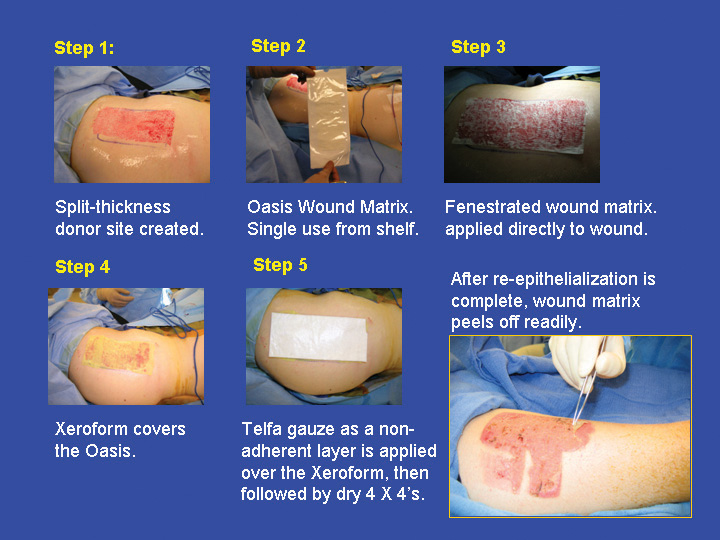Sunday, October 28, 2007
13322
Use of Oasis Wound Matrix For Split-thickness Skin Graft Donor Sites
Oasis is a naturally derived biomaterial obtained from porcine intestinal submucosa, which acts as an extracellular matrix. This wound matrix functions as a scaffolding to support cell adherence and promotes rapid cellular proliferation and capillary ingrowth. This biomaterial contains key components of the dermal extracellular matrix such as collagen, elastin, glycosaminoglycans, glycoproteins, and proteoglycans, and growth hormones. Since its approval by the FDA in 2000, relatively few papers have been published. No articles have been reported describing the use of Oasis for dressing over split-thickness skin graft donor sites. From November 2003 to December 20006, we have utilized this wound matrix as a dressing over split-thickness donor sites in 131 patients. Our technique entails application of Oasis directly over the donor site. This is then covered with Xeroform, Telfa, and then 4 x 4 gauzes. To secure the dressing, we use Tagaderm tape for the smaller donor sites and a circumferential wrap with Kerlex for the larger donor sites. Epithelialization was complete in 1-3 weeks with an average of 2 weeks. Only two cases were there delayed healing beyond one month. Most remarkably, very few patients complain of significant pain at the skin graft donor site, since the Oasis wound matrix acted as a biological dressing protecting the nerve endings. The wound matrix forms a scab-like sealant which readily peels off when epithelialization is complete. We routinely change the first dressing at postoperative day 4 to 6. The first dressing is performed earlier if there is excessive drainage soaking through the dressing. The Oasis and Xeroform is left on. After the first dressing change, subsequent outer layers of Telfa and 4 X 4's are changed every two to three days until epithelialization is complete, at which point the Oasis and Xeroform spontaneously come off. This wound matrix derived from porcine intestinal submucosa, with overlying Xeroform, provides for a low-maintenance dressing with good pain control.
View Synopsis (.doc format, 457.0 kb)

